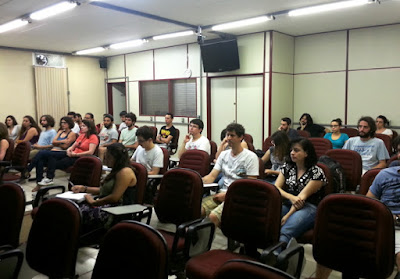Data: 06 de novembro de 2015
Date: November 06th, 2015
Hora: 14h:00
Time: 02h:00 PM
Local (Room): Sala IB11, Bloco O, Prédio da Pós-graduação, Instituto de Biologia, Unicamp, Campinas, São Paulo, Brasil

Dando sentido aos dados
A análise, apresentação e interpretação de resultados científicos parecem focar mais e mais na "significância" dos resultados. Nós começaremos dando alguns exemplos do problema com esse foco em "hipótese nulas", "P-valor", "aceitação" e "rejeição". Algumas vezes o foco pode levar a conclusões absurdas ou obscurecer o que os resultados sugerem sobre a natureza. Nós proporemos algumas soluções. Entre elas, o reconhecimento de que o raciocínio "Bayesiano" é fundamental para o pensamento científico incluído por humanos. Iremos discutir que a construção de "múltiplas hipótese de trabalho" (ou modelos), e seus refinamentos iterativos como novas informações são obtidas, são um tipo de abordagem Bayesiana informal que nos leva a um rápido progresso na ciência. Nossa intenção nesta palestra é iniciar apresentando nossas ideias, mas esperamos que uma discussão geral seja desenvolvida rapidamente.
Nickolas M. Waser possui bacharelado em Biologia (ênfase em Antropologia) pela Stanford University (EUA) e Ph.D em Ecologia e Biologia Evolutiva (ênfase em Genética) pela University of Arizona (EUA). Atualmente é professor emérito no Departamento de Biologia da University of California Riverside (EUA). Nick também é professor adjunto na School of Natural Resources and the Environment na University of Arizona (USA). Ele tem estudado vários aspectos da interação entre plantas e seus animais polinizadores no Rocky Mountain Biological Laboratory (RMBL) por mais de 40 anos. Este trabalho perpassa genética de populações e quantitativa, comportamento animal, demografia e conservação biológica, com o principal foco em ecologia evolutiva de interações planta-polinizador. Quando não está trabalhando nas montanhas ele tem desfrutado de uma longa associação com plantas e animais dos desertos de Mojave, Sonoran e Great Basin.
Mary V. Price é graduada em Biologia pela Vassar College (EUA), PH.d em Zoologia e Botânica pela University of Arizona (EUA) e pós doutorado pela Dalhousie University (EUA) (com a E. C. Pielou). Atualmente é professora emérita em biologia na University of California Riverside (EUA) e professora adjunta na School of Natural Resources and the Environment na University of Arizona (EUA). Seus interesses incluem ecologia evolutiva de animais terrestre e plantas, especialmente em ecossistemas áridos e montanos. Ela usou ratos-cangurus de deserto como sistema modelo para explorar fatores que determinam o número de interações entre plantas e granívoros. Esse trabalho também visou a conservação biológica de espécies de ratos-cangurus ameaçados. Adicionalmente, ela conduziu uma pesquisa de longa duração em como interações mutualísticas entre plantas e polinizadores moldam a evolução da morfologia floral, padrão de reprodução e dinâmica de populações em plantas. Ela tem estimulado recentemente a discussão de como pesquisas de longa duração em um único lugar contribui para o
conhecimento ecológico.

Making sense of data
The analysis, presentation, and interpretation of scientific results seems to be focused more and more on the “significance” of the results. We begin by giving a few examples of the problems with this focus on “null hypotheses”. “P-values”, “acceptance”, and “rejection”. Sometimes the focus can lead to absurd conclusions, but even if not, it can obscure what the results actually suggest about nature. We will propose a few simple solutions. Among these is the recognition that “Bayesian” reasoning is fundamental to human-including scientific-thinking. We will argue that the construction of “multiple working hypotheses” (or models of nature), and their iterative refinement as new information is obtained, are a kind of informal Bayesian approach that leads to faster progress in science. Our intent in this public talk is to begin by presenting some of our ideas - but we hope that a general discussion will develop quickly.
Nickolas M. Waser has bachelor's degree in Biology (minor in Anthropology) at Stanford University (USA) and Ph.D in Ecology and Evolutionary Biology (minor in Genetics) at University of Arizona (USA). Currently is Professor Emeritus from the Department of Biology at the University of California Riverside. He also is Adjunct Professor in the School of Natural Resources and the Environment at the University of Arizona (USA). He has studied many aspects of the interactions between flowering plants and their animal pollinators at Rocky Mountain Biological Laboratory (RMBL) over the past 40+ years. This work has touched on population and quantitative genetics, animal behavior, demography, and conservation biology, with its main focus being evolutionary ecology of the plant-pollinator interaction. When not working in the mountains he has enjoyed a long association with plants and animals of the Mojave, Sonoran, and Great Basin Deserts.
Mary V. Price has bachelor's degree in Biology at Vassar College (USA), Ph.D in Zoology and Botany at University of Arizona (USA) and Postdoctoral at Dalhousie University (USA) (with E. C. Pielou). Currently is Professor of Biology Emerita from the University of California Riverside (USA) and Adjunct Professor in the School of Natural Resources and the Environment at the University of Arizona (USA). She interests include the evolutionary ecology of terrestrial animals and plants, especially in arid and montane ecosystems. She has used desert kangaroo rats and their relatives as a model system for exploring factors that determine the number and phenotypic attributes of coexisting species in a community, and the nature of interactions between plants and granivores. This work also encompasses conservation biology of endangered kangaroo rat species. In addition, she has carried out long-term research on how the mutualistic interactions between plants and pollinators mold the evolution of flower morphology, plant mating patterns, and plant population dynamics. She has been stimulated in recent years to think of how long-term research in single places contributes to ecological knowledge.
Fotos da palestra
Lecture photos
 |
| Photo: Gustavo Shimizu |
 |
| Photo: Gustavo Shimizu |








